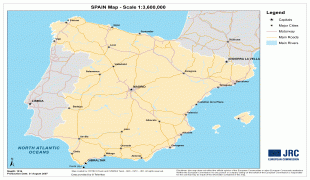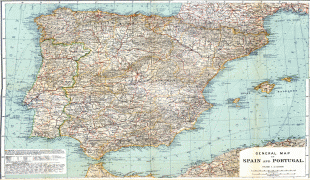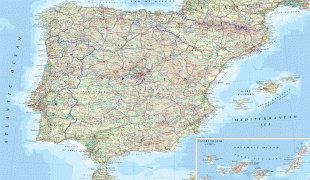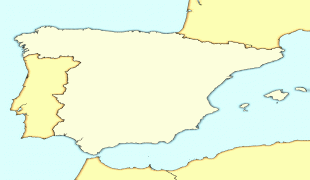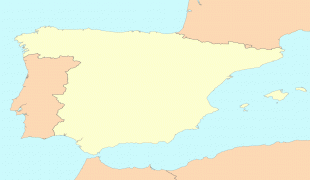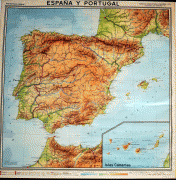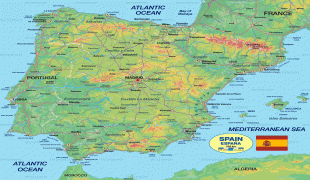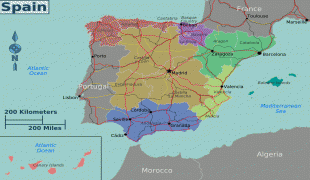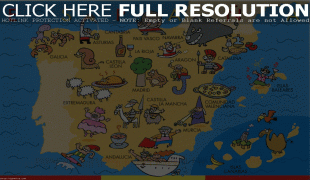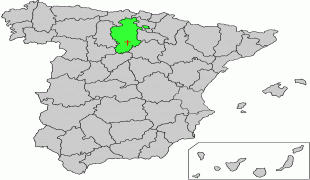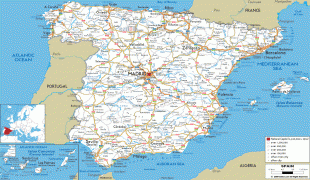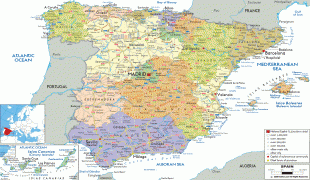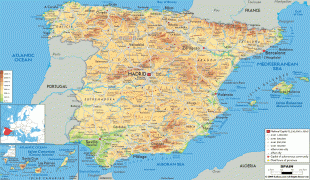Spain (Kingdom of Spain)
 |
 |
| Flag of Spain | |
Anatomically modern humans first arrived in the Iberian Peninsula around 42,000 years ago. The ancient Iberian and Celtic tribes, along with other pre-Roman peoples, dwelled the territory maintaining contacts with foreign Mediterranean cultures. The Roman conquest and colonization of the peninsula (Hispania) ensued, bringing the Romanization of the population. Receding of Western Roman imperial authority ushered in the migration of different non-Roman peoples from Central and Northern Europe with the Visigoths as the dominant power in the peninsula by the fifth century. In the early eighth century, most of the peninsula was conquered by the Umayyad Caliphate, and during early Islamic rule, Al-Andalus became a dominant peninsular power centered in Córdoba. Several Christian kingdoms emerged in Northern Iberia, chief among them León, Castile, Aragon, Portugal, and Navarre made an intermittent southward military expansion, known as Reconquista, repelling the Islamic rule in Iberia, which culminated with the Christian seizure of the Emirate of Granada in 1492. Jews and Muslims were forced to choose between conversion to Catholicism or expulsion, and eventually the converts were expelled through different royal decrees.
The dynastic union of the Crown of Castile and the Crown of Aragon in 1479, often considered the formation of Spain as a country, was followed by the annexation of Navarre and the incorporation of Portugal during the Iberian Union. In the wake of the Spanish colonization of the Americas after 1492, the Crown came to hold a large overseas empire, which underpinned the emergence of a global trading system primarily fuelled by the precious metals extracted in the New World. Centralisation of the administration and further state-building in mainland Spain ensued in the 18th and 19th centuries, during which the Crown saw the loss of the bulk of its American colonies a few years after the Peninsular War. The country veered between different political regimes; monarchy and republic, and following a 1936–39 devastating civil war, the Francoist dictatorship that lasted until 1975. With the restoration of democracy under the Constitution of Spain and the entry into the European Union in 1986, the country experienced profound economic, political and social change.
Spanish art, music, literature and cuisine have been influential worldwide, particularly in Western Europe and the Americas. As a reflection of its large cultural wealth, Spain has the world's fourth-largest number of World Heritage Sites (49) and is the world's second-most visited country. Its cultural influence extends over 570 million Hispanophones, making Spanish the world's second-most spoken native language.
Spain is a developed country, a secular parliamentary democracy and a constitutional monarchy, with King Felipe VI as head of state. It is a high-income country and an advanced economy, with the world's sixteenth-largest economy by nominal GDP and the sixteenth-largest by PPP. Spain has the twelfth-highest life expectancy in the world. It ranks particularly high in healthcare quality, with its healthcare system considered to be one of the most efficient worldwide. It is a world leader in organ transplants and organ donation. Spain is a member of the United Nations, the European Union, the Eurozone, the Council of Europe (CoE), the Organization of Ibero-American States (OEI), the Union for the Mediterranean, the North Atlantic Treaty Organization (NATO), the Organisation for Economic Co-operation and Development (OECD), Organization for Security and Co-operation in Europe (OSCE), the World Trade Organization (WTO) and many other international organisations.
The origins of the Roman name Hispania, and the modern España, are uncertain, although the Phoenicians and Carthaginians referred to the region as Spania, therefore the most widely accepted etymology is a Levant-Phoenician one. There have been a number of accounts and hypotheses of its origin:
The Renaissance scholar Antonio de Nebrija proposed that the word Hispania evolved from the Iberian word Hispalis, meaning "city of the western world".
Jesús Luis Cunchillos argued that the root of the term span is the Phoenician word spy, meaning "to forge metals". Therefore, i-spn-ya would mean "the land where metals are forged". It may be a derivation of the Phoenician I-Shpania, meaning "island of rabbits", "land of rabbits" or "edge", a reference to Spain's location at the end of the Mediterranean; Roman coins struck in the region from the reign of Hadrian show a female figure with a rabbit at her feet, and Strabo called it the "land of the rabbits". The word in question (compare modern Hebrew Shafan, שפן) actually means "Hyrax", possibly due to Phoenicians confusing the two animals.
Hispania may derive from the poetic use of the term Hesperia, reflecting the Greek perception of Italy as a "western land" or "land of the setting sun" (Hesperia, Ἑσπερία in Greek) and Spain, being still further west, as Hesperia ultima.
There is the claim that "Hispania" derives from the Basque word Ezpanna meaning "edge" or "border", another reference to the fact that the Iberian Peninsula constitutes the southwest corner of the European continent.
Currency / Language
| ISO | Currency | Symbol | Significant figures |
|---|---|---|---|
| EUR | Euro | € | 2 |
| ISO | Language |
|---|---|
| EU | Basque language |
| CA | Catalan language |
| GL | Galician language |
| OC | Occitan language |
| ES | Spanish language |






